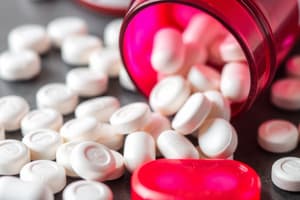Podcast
Questions and Answers
What are skin cleansers used to remove?
What are skin cleansers used to remove?
- Wound biofilms and bacteria
- Dirt, sebum, oil, and dead skin cells (correct)
- Dry skin conditions
- Herpes simplex virus (HSV)
What is the purpose of applying desloughing agents?
What is the purpose of applying desloughing agents?
- To remove dirt and dead skin cells
- To aid in wound healing and removal of wound biofilms (correct)
- To treat herpes simplex virus (HSV)
- To neutralize stomach acid
What is Micreme used to treat?
What is Micreme used to treat?
- Skin cancer
- Inflamed skin conditions such as tinea and ringworm (correct)
- Herpes simplex virus (HSV)
- Dry skin conditions
What is the purpose of applying sunscreen?
What is the purpose of applying sunscreen?
What is the primary mechanism of action of paracetamol?
What is the primary mechanism of action of paracetamol?
What are antacids used to do?
What are antacids used to do?
What is the primary reason for administering the correct dose of paracetamol?
What is the primary reason for administering the correct dose of paracetamol?
What is the primary benefit of using topical application in medical administration?
What is the primary benefit of using topical application in medical administration?
What is Zovirax used to treat?
What is Zovirax used to treat?
Why do nurses use gloves when applying topical medications?
Why do nurses use gloves when applying topical medications?
What is Aqueous cream BP used to treat?
What is Aqueous cream BP used to treat?
What is Betaline used to treat?
What is Betaline used to treat?
What is the primary characteristic of an ointment?
What is the primary characteristic of an ointment?
What is the primary characteristic of a cream?
What is the primary characteristic of a cream?
What is the primary benefit of using transdermal patches?
What is the primary benefit of using transdermal patches?
What is the primary reason for using topical medications?
What is the primary reason for using topical medications?
What is the primary function of antacids in the management of GORD or GERD?
What is the primary function of antacids in the management of GORD or GERD?
What happens to the pH of the stomach when someone uses antacids?
What happens to the pH of the stomach when someone uses antacids?
What is the term for the phenomenon where the stomach produces more acid after the ingestion of certain foods or medications?
What is the term for the phenomenon where the stomach produces more acid after the ingestion of certain foods or medications?
How do proton pump inhibitors like Omeprazole (generic) or Losec manage to reduce the production of HCL?
How do proton pump inhibitors like Omeprazole (generic) or Losec manage to reduce the production of HCL?
Which of the following antacids is NOT a common over-the-counter (OTC) medication?
Which of the following antacids is NOT a common over-the-counter (OTC) medication?
What is the primary mechanism of action of lactulose in promoting bowel regularity?
What is the primary mechanism of action of lactulose in promoting bowel regularity?
What is the primary benefit of using proton pump inhibitors like Omeprazole (generic) or Losec in managing GORD or GERD?
What is the primary benefit of using proton pump inhibitors like Omeprazole (generic) or Losec in managing GORD or GERD?
Which of the following is a common symptom associated with acid rebound?
Which of the following is a common symptom associated with acid rebound?
Flashcards are hidden until you start studying
Study Notes
Antacids and Gastric Oesophageal Reflux Disorder (GORD)
- Antacids work by buffering the acidic environment in the stomach, helping to alleviate symptoms associated with GORD.
- When someone uses antacids, the pH of the stomach increases as the antacids work to neutralize or raise the acidity level of the stomach.
Common Antacids
- Quick-Eze
- Gaviscon
- Mylanta
- Tums
- Rolaids
Acid Rebound
- Refers to the phenomenon where the stomach produces more acid after the ingestion of certain foods or medications.
- Can result in an increase in gastric acidity, leading to symptoms such as heartburn or indigestion.
Proton Pump Inhibitors (PPIs)
- Reduce the production of HCL by inhibiting the action of parietal cells in the stomach.
- Examples: Omeprazole (generic) or Losec.
- Decrease the production of HCL, making the environment of the stomach less acidic.
Lactulose
- Exerts an osmotic effect on the bowel, increasing fluid volume and keeping more water in the bowel.
- Results in an increased amount of water being absorbed into the bowel, causing faeces to become softer.
- Stimulates peristalsis in the colon, making faecal matter easier to pass.
Skin Preparations
Cleansers
- To remove dirt, sebum, oil, and dead skin cells.
Desloughing Agents
- To help achieve and maintain wound bed and aid removal of wound biofilms, facilitating wound healing.
Counterirritants
- To make the skin feel cool and then warm.
Sunscreen
- To protect your skin from sunburn, skin cancer, and premature ageing.
Micreme
- Used to treat inflamed skin conditions, such as tinea, athletes foot, ringworm, and thrush infections of the skin.
- Apply sparingly once or twice daily to the affected areas of the body and rub gently with a finger into the skin.
- Side effects: skin irritation, itchy or itchy rash, red or inflamed skin, pale areas of skin, burning skin sensation, blurred vision.
Zovirax
- Used to treat herpes simplex virus (HSV).
- Apply 5 times daily at approximately 4-hourly intervals, omitting nighttime, application, treatment for 5 days.
- Side effects: drying or flaky skin.
Aqueous Cream BP
- Used to treat dry skin conditions.
- Apply as often as required.
- Used also as a soap substitute.
- Side effects: high rates of skin irritation.
Betaline
- Used to treat common skin infections, such as skin around nails, minor burns, cuts, and scratches.
- External use only, apply directly to the affected area two to three times daily.
- Side effects: not recommended during pregnancy.
Pharmacology -- Digestive System
- Antacids are made from weak alkaline products and are used to neutralize or raise the pH of the stomach.
Pharmacology -- Paracetamol
- Antipyretic means to prevent or reduce fever.
- Forms of paracetamol: tablet, capsule, and oral liquid.
- Mode of action: prevents the production of prostaglandins, which reset body temperature, causes sweating and dilation of blood vessels, which cool the body via radiation and evaporation.
- Importance of administering the correct dose: to avoid overdosing, which can result in serious liver damage.
Pharmacology -- Topical Medications
- Topical application in medical administration means medication is applied to a specific area of the body.
- Methods of topical application: direct application, transdermal discs or patches, applying moist dressings, soaking body parts in a solution, or giving medicated baths.
- Reasons to use gloves for the application of topicals: protects nurses from contact with medication and keeps skin area clean from infection.
Skin Preparations
- Lotion: medication in liquid suspension applied externally to protect skin.
- Ointment (salve): semi-solid, externally applied preparation, usually containing one or more medications.
- Paste: semi-solid preparation, thicker and stiffer than ointment; absorbed through skin more slowly than ointment.
- Cream: liniment: preparation usually containing alcohol, oil, or soapy emollient that is applied to skin.
Studying That Suits You
Use AI to generate personalized quizzes and flashcards to suit your learning preferences.




